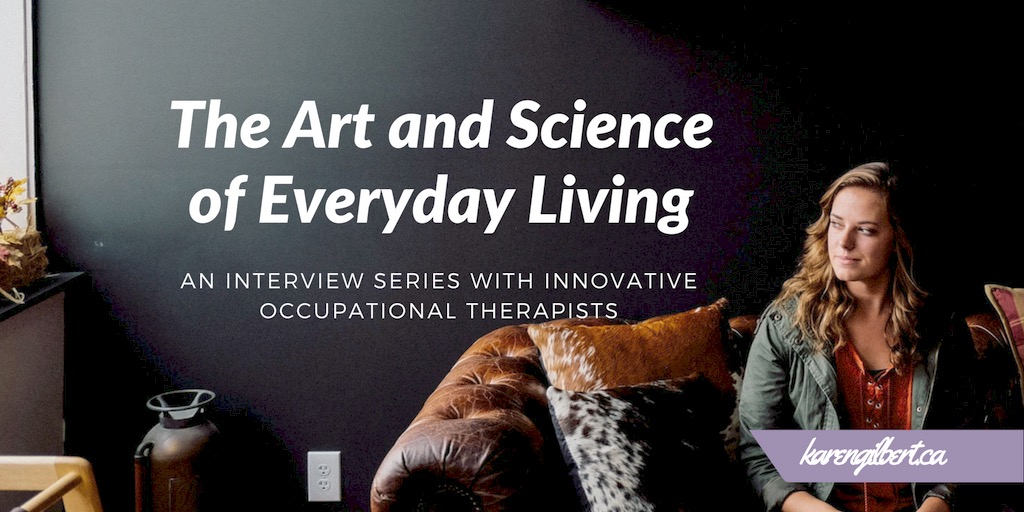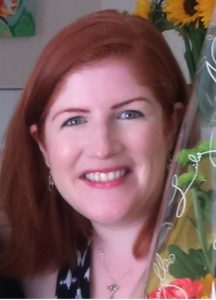
“The Art and Science of Everyday Living” is an interview series with innovative occupational therapists.
We are shining a spotlight on OT and how you can benefit.
Our next occupational therapsit brings a wealth of knowledge about Myalgic Encephalomyelitis or Chronic Fatigue Syndrome (ME/CFS), a complex physical condition that affects people of all ages and all walks of life.
If you have an invisible health condition like ME/CFS, you may find pieces of your own story reflected in the words of the occupational therapists interviewed in this series. You may even find a tip or two to help you live your life with more ease, joy and meaning and foster a renewed sense of hope.
As always, please speak with your own health care provider for individualized advice before applying any new strategy. If you need further support and the OT profiled lives in your area, feel free to reach out for more information.
We are glad you are here!

 Mary Symons has been helping people achieve goals, overcome adversity and live the life they want since 2002. Through her company “Think Believe Achieve Ltd”, she provides private occupational therapy and life coaching in Hertfordshire, England. She specializes in neurological rehabilitation, with a special interest in acquired brain injury, stroke, chronic fatigue syndrome/myalgic encephalitis and chronic pain.
Mary Symons has been helping people achieve goals, overcome adversity and live the life they want since 2002. Through her company “Think Believe Achieve Ltd”, she provides private occupational therapy and life coaching in Hertfordshire, England. She specializes in neurological rehabilitation, with a special interest in acquired brain injury, stroke, chronic fatigue syndrome/myalgic encephalitis and chronic pain.
Mary and I connected through the OT community on Twitter and I came across her video about online occupational therapy intervention for people with chronic fatigue syndrome/myalgic encephalitis/post viral fatigue syndrome. I am so grateful that she is here to share her insights with us.
Over to you, Mary!
How do you describe your role as an OT to the people/clients that you work with
My intervention as an occupational therapist is about giving people “tools” and resources to take back some control of their lives. I firstly look at what a person is finding difficult. After this, solutions are explored to work towards the person regaining control of their lives after injury, illness or chronic health problems. The strategies used are specific to each person’s experience, lifestyle and goals.
Occupational therapists have studied anatomy, physiology, biomechanics, neuroscience, psychology, medical conditions and ergonomics. This knowledge is applied to identify what each individual’s problems are. We use evidence-based knowledge, clinical skills and experience, to provide practical solutions and/or rehabilitation.
Having occupational therapy in your day, helps you work, rest and play!
In your practice, what are some common struggles or symptoms that you support people to adapt to, manage, or overcome?
I look at what each individual would like to get back to doing, and then plan on gradually integrating a number of techniques and strategies to their specific lifestyle. A lot of people want to work on promoting better sleep and learn mindfulness techniques as part of their plan. My intervention is based on; evidence-based practice fatigue management for in those with neurological conditions, what has helped me personally as a CFS/ME sufferer, and what has worked for others I’ve worked with over the years.
Everyone is completely different in the severity of their symptoms and how the symptoms impact on their lives. I find that everyone (ideally) would like to get back to the lifestyle and energy levels they had before they fell ill. For most, that will be a very slow process, or just won’t happen, and this takes time to accept and adapt to. I’m here to make the situation more manageable with the benefit of having personal experience of overcoming this myself.
Are there strategies that you find yourself mentioning often to clients that someone reading this could apply in their life today?
Most of my clients have great ideas on what strategies/principles to use, but the ways they have tried to adopt these into their everyday life, has not worked for them. Having occupational therapy helps integrate strategies and techniques into their own environments and lifestyles effectively, not just for the duration of therapy, but for life!
When I was first unwell in 2003, it took years to find what worked for me. I feel if I had received support from an expert occupational therapist when I was first diagnosed, I would have mastered managing my condition a lot sooner.
Favourite or most recommended online resources, books or apps?
I’ve collated bookcases full of resources over the years and I use many different sources of information. I definitely advocate learning as much about your condition as possible, but it depends on what problems each person has, to what I could specifically advise for books, websites and apps. But I’m happy to give recommendations to anyone emailing me a query.
What do clients most often express appreciation for about your perspective as an OT?
People appreciate that I get things moving in the right direction, understand each person’s priorities and that I look for a number of solutions to make life easier. Occupational therapy considers the whole person, environment and activities they are doing; which seems to encompass all parts of life! With a broad range of clinical experience and skills, I can assess and suggest solutions/techniques/treatments to manage many different difficulties.
.

What area of emerging research are you most excited about currently? How do you think it will shape your OT practice and the lives of the people you work with in the years to come?
Latest evidence in how the gut and metabolic dysfunction contribute to the symptoms of ME/CFS. I feel that this will lead to breakthroughs urgently needed for people who have the most severe forms of this condition. I also hope it will raise awareness of this condition being treated as a metabolic/neurological condition by all medical and health professionals.
I am also excited about the potential we now have to further develop existing technology to improve the consistency and intensity of rehabilitation to those with brain injury and stroke. In the future, therapists will still have a huge role to play in rehabilitation, but technology will be a great tool to enhance our interventions.
How has being an occupational therapist influenced how you live your life?
Seeing people overcome life’s challenges on a daily basis help get things into perspective and I don’t seem to worry over the little things I used to. I also try to live well and make the most of everything I have
Occupational therapists believe that the ‘occupations’ we engage in are essential to our health and well-being. What are some occupations that shape who you are, bring meaning to your life and/or restore you?
Sleeping well, working, cooking, spending time with friends, dancing, creative writing, painting, comedy, playing music, and gardening to name a few!
Three sensory experiences that bring you a sense of calm?
Listening to soothing music, smelling lavender, having a back massage.
What core values guide you in your life and in your work?
Do your best, have integrity and always be kind.

Do you have a phrase, mantra or strategy that helps you show up and live brave, even when life is difficult?
Keep calm and have a cup of tea! (Can you tell I live in England?)
One (big or small) thing on your bucket list and one you have already checked off?
I’m so lucky to have travelled to so many amazing places, met great people, and I’ve lived and worked in other countries. I would love to achieve a lot more through my therapy work, so watch this space!
Words of wisdom or encouragement for anyone reading this who is struggling with a health condition or a life transition?
Help is out there, don’t ever lose hope that there are better times ahead.
Mary Symons, Highly Specialist Occupational Therapist: “I qualified in 2002 with a BSc (Hons) Occupational Therapy from the University of Southampton, England. Since then, I have worked in many services in the UK, Ireland and Australia and previously was a clinical therapy lead in the National Health Service. I specialise in neurological rehabilitation, with a specialist interest in acquired brain injury, stroke, chronic fatigue syndrome/myalgic encephalitis and chronic pain. My company “Think Believe Achieve Ltd” provides private occupational therapy and life coaching, to people in their own homes in Hertfordshire and surrounding areas. I also offer skype call sessions for people with chronic fatigue syndrome/myalgic encephalitis who are not within travelling distance from my service.”

Thanks for these great posts. I have been inspired by the first two articles and plan to use some of the ideas in my own practice.